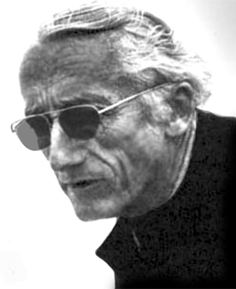|
|
|
 |
| |
Jacques Cousteau |
|
| |
Jacques-Yves Cousteau (11 June 1910 – 25 June 1997) was a French naval officer, explorer, conservationist, filmmaker, innovator, scientist, photographer, author and researcher who studied the sea and all forms of life in water. He co-developed the Aqua-Lung, pioneered marine conservation and was a member of the Académie française. He was also known as "le Commandant Cousteau" or "Captain Cousteau".
Early 1940s: Innovation of modern underwater diving
The years of World War II were decisive for the history of diving. After the armistice of 1940, the family of Simone and Jacques-Yves Cousteau took refuge in Megève, where he became a friend of the Ichac family who also lived there. Jacques-Yves Cousteau and Marcel Ichac shared the same desire to reveal to the general public unknown and inaccessible places — for Cousteau the underwater world and for Ichac the high mountains.
|
 |
| |
In 1943, they made the film Épaves (Shipwrecks), in which they used two of the very first Aqua-Lung prototypes. These prototypes were made in Boulogne-Billancourt by the Air Liquide company, following instructions from Cousteau and Émile Gagnan.
During the 1940s, Cousteau is credited with improving the aqua-lung design which gave birth to the open-circuit scuba technology used today. According to his first book, The Silent World: A Story of Undersea Discovery and Adventure (1953), Cousteau started diving with Fernez goggles in 1936, and in 1939 used the self contained underwater breathing apparatus invented in 1926 by Commander Yves le Prieur. Cousteau was not satisfied with the length of time he could spend underwater with the Le Prieur apparatus so he improved it to extend underwater duration by adding a demand regulator, invented in 1942 by Émile Gagnan.
In 1943 Cousteau tried out the first prototype aqua-lung which finally made extended underwater exploration possible.
Legacy
Cousteau's legacy includes more than 120 television documentaries, more than 50 books, and an environmental protection foundation with 300,000 members.
Cousteau liked to call himself an "oceanographic technician." He was, in reality, a sophisticated showman, teacher, and lover of nature. His work permitted many people to explore the resources of the oceans.
His work also created a new kind of scientific communication, a simple way of sharing scientific concepts, soon employed in other disciplines and became one of the most important characteristics of modern television broadcasting. |
|
|
| |
|
|
|
 |
|
|
|
|
|
|
|